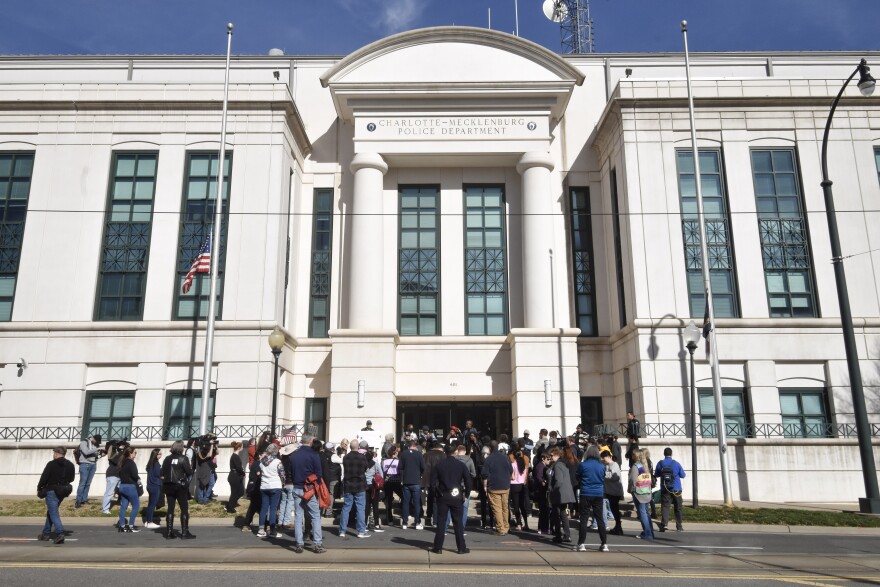Protesters marching through uptown on Saturday to call for change in the wake the death of Tyre Nichols were joined by Charlotte's top cop, Charlotte-Mecklenburg Police Chief Johnny Jennings.
The march came a day after the release of video footage showing Memphis police kicking, beating and pepper-spraying the 29-year-old following a traffic stop this month. He died three days later.
At the start of the protest Saturday, about 70 people stood outside the Mecklenburg County courthouse holding pictures of Nichols and signs calling for justice.
At the center of the crowd, Charlotte-Mecklenburg NAACP President Corine Mack told reporters she cried after watching Nichols call for his mother as he was beaten by five officers.
SUPPORT LOCAL NEWS

As a nonprofit newsroom, WFAE relies on readers like you to make stories like this possible. Our local reporting is vital to the health of our communities and our democracy, but we can’t do this without you. Please consider supporting our journalism by contributing as little as $10 today.
"What we saw happen to Tyre Nichols could have been any one of our children at any given time," she said.
Memphis police say the officers who beat Nichols — all of whom are Black, like Nichols — have been fired and charged with second-degree murder. Local activist Kass Ottley said she thought others should face charges too.
"The paramedics that didn't render aid — they should have been charged. The fire department that came up and didn't do anything — the should have been charged. Everybody who stood there and watched this man get beaten to death and rendered no aid should be charged," she said.
As protesters prepared to march, some were surprised to see Jennings. The chief asked if he and other officers could join.

"If you (are) in solidarity with us, you're willing to sit at the table to create change, then you can march with us," Mack said.
"I'll be glad to," Jennings replied.
The police chief and other officers marched with protesters along Fourth and Alexander Streets to CMPD headquarters, then past the county jail into Marshall Park.
Tiawana Brown held a bright pink sign with Nichols' picture and the words "Say His Name," and "Defund The Abusers." She thought major systemic change was still needed.
"You continue to kill us, run us down, shoot us, raid our houses, do all that stuff to Black women and men," she said. "So we have to do something different. What's going on is not working."
CMPD Captain Jesus Rendon said he and other officers joined the march hoping to be a counterpoint to what they saw in Memphis.
"When I saw it on TV, I was like, that's not policing. That's criminal activity, and that's not what policing looks like," he said.
He thought police departments needed to look inward, but didn't think defunding the police was the answer.

"We know what happens when that happens. We lose a lot of members of law enforcement because of funding and distrust of the police. A lot of people walk away from the profession. And that only affects the community, and it harms the organization," he said.
Another protester, Rory Pegram, said the story of Nichols' death hit close to home. He said he was once beaten by police in Pennsylvania while walking home at night in the 1980s.
"Same exact scenario. Handcuffed, beaten, punched, kicked, the baton. All that," he said.
He said police mistook him for a suspect, and were never disciplined. He said seeing the video from Memphis was like a flashback.
"I mean, I broke down. I mean, I got kind of, froze up, because I — it replayed — I could see myself in his position," he said.
He thought a culture shift is needed in policing. But in the end, he feared individual officers out on the streets would still wield the ultimate power when drivers who look like him are pulled over.


